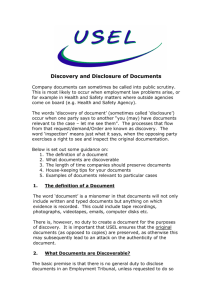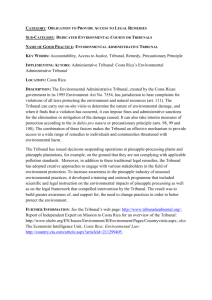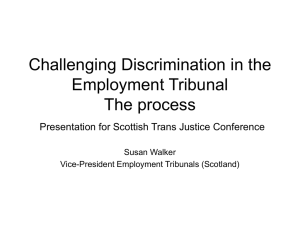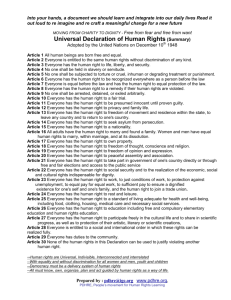Human Resource Management: A Case Study Approach
advertisement
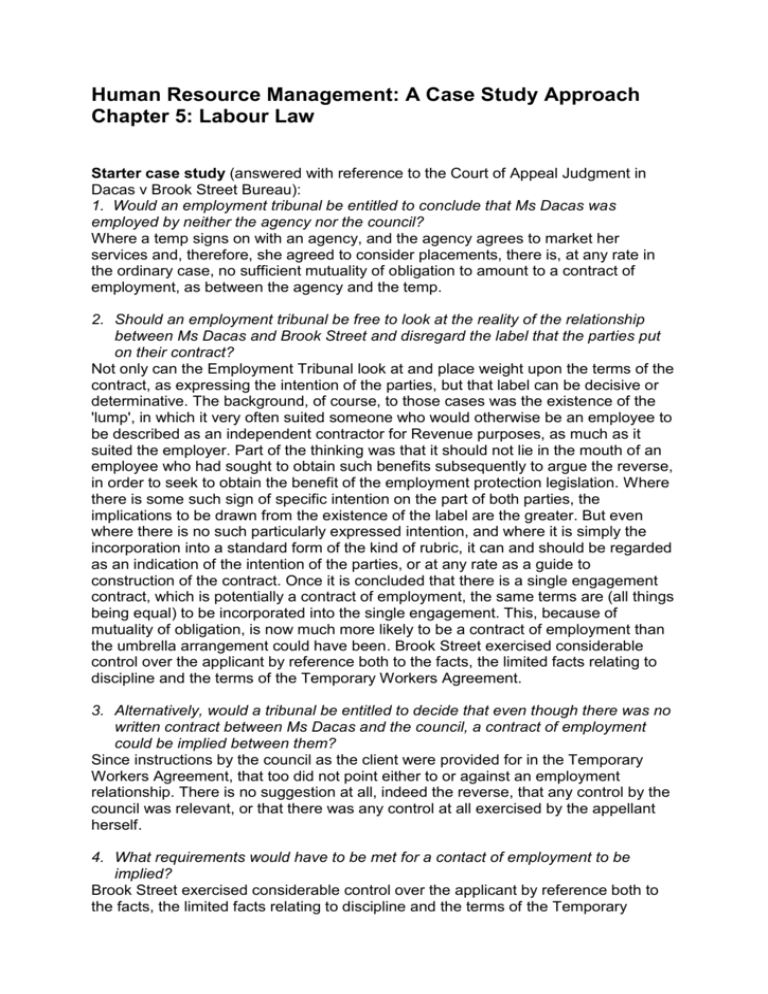
Human Resource Management: A Case Study Approach Chapter 5: Labour Law Starter case study (answered with reference to the Court of Appeal Judgment in Dacas v Brook Street Bureau): 1. Would an employment tribunal be entitled to conclude that Ms Dacas was employed by neither the agency nor the council? Where a temp signs on with an agency, and the agency agrees to market her services and, therefore, she agreed to consider placements, there is, at any rate in the ordinary case, no sufficient mutuality of obligation to amount to a contract of employment, as between the agency and the temp. 2. Should an employment tribunal be free to look at the reality of the relationship between Ms Dacas and Brook Street and disregard the label that the parties put on their contract? Not only can the Employment Tribunal look at and place weight upon the terms of the contract, as expressing the intention of the parties, but that label can be decisive or determinative. The background, of course, to those cases was the existence of the 'lump', in which it very often suited someone who would otherwise be an employee to be described as an independent contractor for Revenue purposes, as much as it suited the employer. Part of the thinking was that it should not lie in the mouth of an employee who had sought to obtain such benefits subsequently to argue the reverse, in order to seek to obtain the benefit of the employment protection legislation. Where there is some such sign of specific intention on the part of both parties, the implications to be drawn from the existence of the label are the greater. But even where there is no such particularly expressed intention, and where it is simply the incorporation into a standard form of the kind of rubric, it can and should be regarded as an indication of the intention of the parties, or at any rate as a guide to construction of the contract. Once it is concluded that there is a single engagement contract, which is potentially a contract of employment, the same terms are (all things being equal) to be incorporated into the single engagement. This, because of mutuality of obligation, is now much more likely to be a contract of employment than the umbrella arrangement could have been. Brook Street exercised considerable control over the applicant by reference both to the facts, the limited facts relating to discipline and the terms of the Temporary Workers Agreement. 3. Alternatively, would a tribunal be entitled to decide that even though there was no written contract between Ms Dacas and the council, a contract of employment could be implied between them? Since instructions by the council as the client were provided for in the Temporary Workers Agreement, that too did not point either to or against an employment relationship. There is no suggestion at all, indeed the reverse, that any control by the council was relevant, or that there was any control at all exercised by the appellant herself. 4. What requirements would have to be met for a contact of employment to be implied? Brook Street exercised considerable control over the applicant by reference both to the facts, the limited facts relating to discipline and the terms of the Temporary Workers Agreement and a finding of mutuality of obligation as between the applicant and Brook Street. That must inevitably amount to the same finding as one at least of irreducible minimum of obligation necessary for a contract of employment that the appellant was not carrying on a business of her own. This appellant was not offering any kind of specialist services; she was not a nurse or a physiotherapist at the hostel, she was a cleaner. This appellant was not providing, on the evidence at any rate, such services to anyone else. She was full-time working at West Drive. On the face of it, she would in ordinary parlance be working as a cleaner on an hourly rate fulltime at a hostel and seen to be an employee, but she would certainly not look like someone who was carrying on business on her own account. Exercise 1: Do you have any knowledge and experience of government employment agencies? What effects might this sort of agency have on a HR professional’s work? Students should consider their own working experiences of government employment agencies, eg Job Centre Plus. The impact on the HR professional might include the requirement of feedback on the interview procedure or that unsuitable candidates may ask to be put forward (merely to keep job seeker's benefits). Using such agencies may help the HR professional ensure that there is a diverse range of candidates for a role. As these types of agencies may also aim to help the long-term unemployed, there may need to be additional support from HR for a successful candidate who is newly returned to the workplace. Exercise 2: Do you have any experience of private employment agencies? How important are they and the rules regulating them to the work of an HR professional? Students should consider their own working experiences of using private employment agencies. They can be very useful and beneficial to the HR professional as they can source and present a short list of (hopefully) high-quality candidates against an organisation's brief, thus removing a high level of administration and work from the HR function. However, as they work on a placement fee basis (usually based on an employee's salary), it is in their interests to get the highest possible salary for their candidate. It is also essential that they wish to be the sole provider to a client – this can have the advantage that a good agency will get to understand the culture of the organisation and find candidates that ‘fit’. The fact that agencies are regulated provides a degree of security to an organisation that they will act ethically. However, private agencies can be seen to be ‘pushy’ in getting business. Exercise 3: Do you have any experience of discrimination at work? How important do you think this aspect of an HR professional’s job is? Students should consider their own working experiences. Awareness of what constitutes discrimination and discrimination legislation is a very important of the HR professional’s role. HR should ensure they have effective policies that are legally correct but also offer encouragement in keeping to the principle and not just the letter of the law. Where discrimination occurs this should be treated seriously and a suitable process followed. HR should be in a position to guide managers and staff on what constitutes discrimination (direct and indirect) and the steps to be taken to ensure that equality of opportunity is provided to all employee and potential employees. Exercise 4: What will be the advantages and disadvantages of equalising employment opportunities for older workers? What impact do you think the new law will have on young people? A big advantage of equalising employment opportunities is that it will ensure that a wide variety of labour is available in the marketplace. However, organisations may reasonably choose to look for certain skills that older workers may not have (eg use of technological applications). As the birth-rate in the UK declines the availability of labour will also decline and the use of older workers will become a necessity. Organisations will need to consider their policies to ensure that they are equally applicable to all workers. For younger workers they may feel that opportunities are closed to them, or that there is greater competition for those opportunities that are available. Case study (answered with reference to the Court of Appeal Judgment in Rihal v London Borough of Ealing): 1. In deciding whether there are racial grounds for less favourable treatment, is an employment tribunal entitled to look at evidence about the conduct of the alleged discriminator both before and after the act about which a complaint has been made? Mr Rihal’s complaints formed part of a continuing course of conduct, and 2. Where there are allegations of direct or indirect discrimination by an employer over a substantial period of time, should the tribunal look at the individual incidents in isolation from one another? The history had to be considered as a whole; and the Tribunal were wholly entitled to approach the facts in that way. The Tribunal in considering individual incidents of a discrimination case are entitled – and indeed, are bound – to consider them in the context of the events taking place around them; individual incidents do not or at least may not occur in a vacuum but in a broad historical context; and in a case in which discrimination over a substantial period is relied open, it is open to the Tribunal to reach conclusions based on the general picture which they derived from the evidence. That general picture may be informed by what the Tribunal found to have occurred in the case of individual incidents; and the Tribunal’s view of incidental incidents may be informed by the Tribunal’s view of the general picture. 3. If an employer has an arrangement that is racially discriminatory, does it make any difference that the manager in charge changes? The situation created by Ms Herman in May 1996 was not rectified before she retired in September 1996. Mr Foxall not only allowed that situation to continue but promoted Mr Gaffikin to the position of acting Capital Programmes Manager, vacated by the retirement of Ms Herman. 4. How relevant is it that there was “‘a force" in existence throughout that prevented Mr Foxall and others from picturing a turban-wearing Sikh with a pronounced accent in the managerial roles, which a person of the applicant’s qualifications and experience could easily have achieved?' Mr Rihal was not only adequate but excellent in his technical role in the eyes of Mr Foxall. However, to reach senior management level, anyone in this area of work must have someone above them who has faith in him to manage others (especially when the person has a Diploma in Management) and deals with people outside the council. Some 'force', not ill intentioned, has prevented anyone having that faith in Mr Rihal. There being no adequate explanation to explain the less favourable treatment, it can be concluded that 'force' was a racial ground. Mr Foxall had departed from the requirement that he consider only the characteristics of the job and had allowed personal factors to enter into his assessment. 5. Where a selection process focuses on experience, should any handicap which the employer has inflicted on a candidate by earlier discriminatory behaviour be taken into account? The playing field was not level. It may be that the inequality was not deliberately created; but it is trite law that differential treatment may occur on racial grounds without any deliberation or conscious discriminatory intent on the part of the person or persons responsible for that treatment. Whether Mr Foxall was or was not conscious that the playing field was not level, it did mean that Mr Rihal was not able to perform at well at interview as another candidate. 6. Is a tribunal entitled to take into consideration the fact that a 'glass ceiling' operated in a particular department, which made it very difficult for those who were not white to obtain senior management positions? The basis for the finding of the glass ceiling was the statistical comparison between the number of non-whites in senior positions in the Housing Department and the number of non-whites in such positions in other departments at Ealing. Such material is relevant to and may be logically probative of a complaint of discrimination because it may assist the complainant to establish a positive case that the treatment of individual employees was on racial grounds. Thus the Tribunal in this case were entitled to give weight to the statistics, both in their conclusions as to the general picture and – because the general picture may inform a Tribunal’s view of specific complaints – in their conclusions as to those specific complaints. 7. Where direct or indirect discrimination is alleged, how relevant is the manner in which the complainant’s grievance is dealt with? There was huge delay in dealing with Mr Rihal’s complaint due to the fact that Mr Dallison realised from the outset that there was a racial element to that complaint and that he wanted to keep a lid on it and hoped it would go away. It was also found as fact that if a white employee had complained, he would have delegated the complaint to Human Resources or dealt with it quickly. On a conscious or a subconscious level Mr Dallison was afraid of what he might find if he looked into the complaint with vigour and that there was a racial ground to his decision to pursue it so tardily. This treatment of the grievance was in itself discriminatory. 8. If Mr Riyal has chosen to resign as a result of his treatment by the employer, could be have complained of constructive dismissal? Constructive dismissal can be claimed if the employer is guilty of conduct which is a significant breach going to the root of the contract. Mr Rihal had been discriminated against repeatedly over an extensive period of time by a variety of people in positions of responsibility, and the mutuality of obligations between the two parties had totally broken down owing to the council's actions. A claim for constructive dismissal would have a good chance of success.


